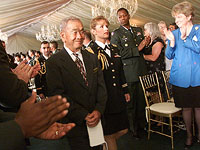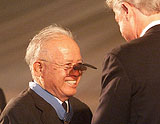 |
||
|
||
|
Nation bestows highest honor
By Susan Roth Yesterday, in a ceremony on the White House lawn, the country made things right at last. Twenty-two Asian American veterans of World War II, most of them from Hawai‘i, received the nation’s highest military award for valor: the Medal of Honor. The seven surviving veterans, including Sen. Dan Inouye, (D-Hawai‘i), accepted the medals from President Clinton, while families of the others received the medals in their memory. Clinton and top military officials said the event - with the most medals ever awarded at one time - was intended to correct a 50-year injustice stemming from racism and fear during the World War II era. "Rarely has a nation been so well-served by a people it has so ill-treated," Clinton said at the ceremony. After suffering so much prejudice in the wake of the attack on Pearl Harbor, "the astonishing fact is that young men of Japanese descent, both in Hawai‘i and on the Mainland, were still willing, even eager, to take up arms to defend America," he said. Until now, only two Asian Americans were among the 301 veterans who have received the Medal of Honor for actions during World War II. But their segregated unit, the 442nd Regimental Combat Team, which included the 100th Infantry Battalion, became known for its extraordinary bravery and its motto, "Go For Broke!" It became the most-decorated unit for its size in American military history, with members receiving the Distinguished Service Cross, the Silver Star, the Bronze Star and more than 9,000 Purple Hearts. In 1996, a provision by Sen. Daniel Akaka, D-Hawai‘i, directed the Army to review the war records of Asian American veterans whose bravery during the war had earned them the Distinguished Service Cross, to determine whether they should have received the Medal of Honor. Normally, the statute of limitations on such awards expires within three years, so the Army had never reviewed their records. As the audience rose in a standing ovation for Inouye, who lost his right arm during the war, Clinton said to him: "Senator Inouye, you wrote that your father told you as you left at age 18 to join the Army and fight a war, that the Inouyes owe an unrepayable debt to America. If I may say so, sir, more than half a century later, America owes an unrepayable debt to you and your colleagues." Others also proved their loyalty, leaving their hospital beds against doctors’ orders to return to battle in Italy and France, where they took 800 casualties in just five days of continual combat. "Americans of Asian descent did much more than prove they were Americans; they made our nation more American," the president said. "They pushed us toward that more perfect union of our founders’ dreams. "It is long past time to break the silence about their courage, to put faces and names with the courage. These American soldiers, with names we at long last recognize as American names, made an impact that soars beyond the force of any battle. They left a lasting imprint on the meaning of America. They didn’t give up on our country, even when too many of their countrymen and women had given up on them. They deserve, at the least, the most we can give - the Medal of Honor." As the president presented the medals, military aides read a citation of each man’s story - of charging hills covered with enemy machine-gun nests, running 100 yards under fire, lobbing hand grenades at close range and continuing to lead others after being shot. About 550 people attended the hourlong ceremony in a tent on the South Lawn of the White House, including more than 200 family members and friends, Defense Department personnel and representatives from veterans groups, some from the 100th and 442nd who agreed that the medals were long overdue their comrades. Clinton marched in with the honorees as the U.S. Army Band played Aaron Copland’s "Fanfare for the Common Man," and the audience rose in another standing ovation. Honolulu resident Ed Ichiyama, a veteran of the 442nd, said he watched his normally reserved comrades soak up the glory. "I could see the pride in their faces," he said. "I think they were speechless. Finally, after all these years." Ichiyama spent six weeks in 1996 researching military records and came up with 26 complete files for consideration. Eleven of them became Medal of Honor upgrades. Many of the honorees initially shrugged off a public ceremony, Ichiyama said. "But once they got here and shook President Clinton’s hand and had the Medal of Honor draped around their neck, I think it finally hit them that this is something special," said Ichiyama. Those attending included Defense Secretary William Cohen; Veterans Affairs Secretary Togo West; Army Secretary Louis Caldera; and Health and Human Services Secretary Donna Shalala. Many members of Congress also attended, including Sen. Akaka and Hawai‘i Democratic Reps. Patsy Mink and Neil Abercrombie. The president mingled with crowd after the ceremony, shaking hands and hugging friends. He also spent time privately greeting the veterans and their families before they left the White House for another reception. Modest almost to the point of embarrassment, the veterans seemed uncomfortable with the attention and accolades showered upon them yesterday. Shizuya Hayashi of Pearl City said he did believe the veterans helped make life in America easier for other Asian Americans. But he was overwhelmed by all the events of the day and the media crush.
Gannett News Service "He’s a humble guy. He thinks they’re making a big fuss," the son said. "He said, ‘Just send the medal in the mail.’ The only reason he agreed to come was because of my two daughters, his only granddaughters." "Talking about the war brings up bad memories. They don’t want to think about it," said granddaughter Sharla Kobashigawa, 20. "He told me stories here and there when I was younger. I was curious, but I always got the feeling he didn’t want to talk about it." The shrapnel still lodged in his knee had him physically uncomfortable as well. But with the help of a crutch, Yeiki Kobashigawa, 82, an original member of the 100th Battalion, got up from his wheelchair yesterday at Arlington National Cemetery to help fellow honorees Rudolph Davila of Vista, Calif., and George Sakato of Denver lay a wreath at the Tomb of the Unknowns. Sakato acknowledged that he hates to talk about the incident that killed a friend three days before he was wounded Nov. 4, 1944 in France. "How I got the medal, I don’t know," he said. "I saw only 90 days of actual combat. Others deserve this much more. But I’ll take it for the guys who didn’t come back." Sakato and others shrugged at the discrimination they faced at the time of the war. Their loyalty to their country was never a question, they said. Sakato, born in Southern California, said his family had three days to move voluntarily or be interned. His father, who ran a fruit stand and meat market, had just bought a meat case for $800, Sakato said. "He sold it for $500, and threw in the store, too." The family evacuated to Glendale, Ariz. But when Sakato and his elder brother, Henry, wanted to join the military effort, their parents supported them. "My parents said, ‘This is your country,’" Sakato said. When Sakato tried to enlist in 1943, he was classified as a 4C enemy alien. In 1944, the Army took him. His brother, Henry, also served and survived. "We looked different, that’s about all. This country was our country," said Isao Tanouye of Rolling Hills, Calif., who accepted the medal for his deceased older brother, Ted. Isao Tanouye, 71, served in Korea, where he also lost his younger brother, Yukiwo. "Our boys were over there, so we wanted to go, too. We wanted to go even though we were behind barbed wire," Isao Tanouye said. "That’s what people don’t understand." Originally from Torrance, Calif., his family was interned in the Rohwer and Jerome camps in Arkansas. Tanouye, who came to Washington with his wife and two daughters, said he had mixed feelings about accepting the medal for his brother, who was killed in action on July 7, 1944. Ted Tanouye was 21 years old. He was engaged to be married when he died. "I don’t want the limelight for me," Isao said. "But I’m happy and humble to get it for his comrades who served under him." |
||
|
Designed by Doug Masuda • Advertiser Web Designer © COPYRIGHT 2000 The Honolulu Advertiser, a division of Gannett Co. Inc. |

